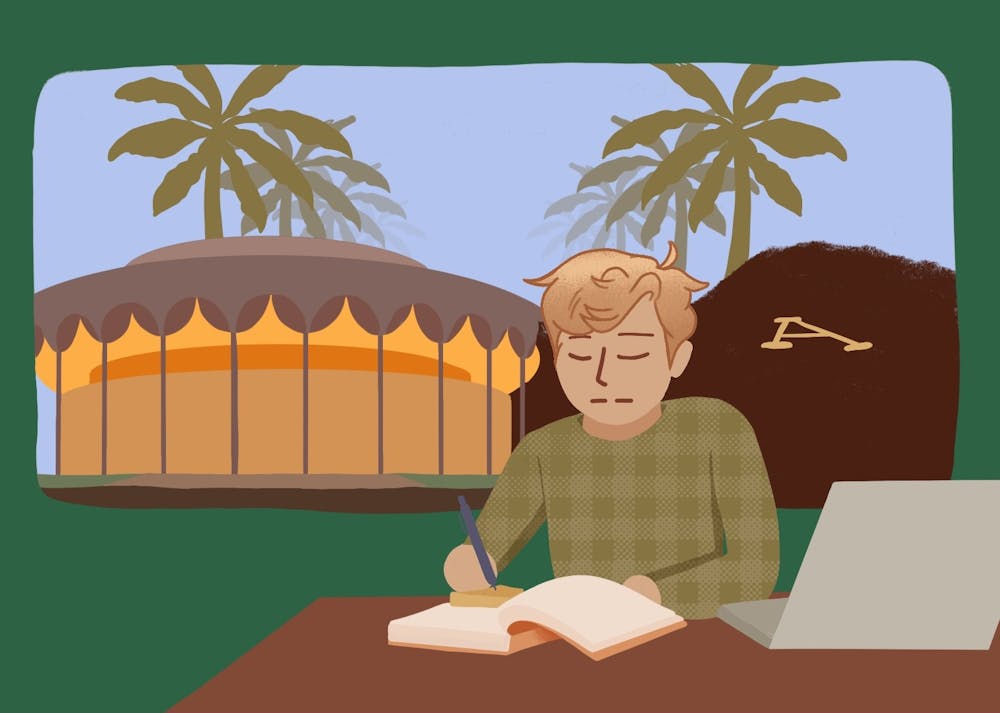I am a freshman at ASU. At the time of publishing, I will be nearly complete with the first semester of my undergraduate education. And I have never once stepped foot on an ASU campus.
I’ve never even been to Phoenix or Tempe. I’ve only been to Arizona once, on a family vacation to visit the Grand Canyon. And yet, in the complex virtual infrastructure of the coronavirus pandemic, I am, for all practical intents and purposes, a full-time student at ASU.
In July, I, like many other out-of-state college students, faced a choice: either move across the country to live in a socially isolated dorm and take majority-virtual classes, or stay home and continue to weather COVID-19 from the relative safety of my own community. It was not an easy decision to make.
My greatest comfort was in the knowledge that I was not alone. A recent study from the Pew Research Center suggests that as many as 52% of young adults aged 18-29 currently live with their parents, the highest percentage since the Great Depression.
Every day I can observe my other freshmen classmates attending Zoom lectures from the comfort of their family’s home or their own apartment rather than a first-year dorm. Many of my hometown friends from high school who would otherwise be attending college out-of-state are also in the same position.
Reimagining the 'college experience'
Perhaps the people who agonized most over the decision to stay home were the older adults in my life. My mom, though generally a pragmatic person, could not bear the knowledge that I would be missing out on the “college experience” that had been so meaningful to her and to many others in her generation.
I didn’t find myself sharing the same concerns. Sure, I was excited to move to my new home and live in a community of people my age and with similar goals, but I didn’t feel any emotional attachment to the notion of the college experience.
Maybe that’s because the college experience today is significantly different and less universal than it was 30 years ago. In decades past, graduating high school left you with about two options, more or less: enter the workforce, or choose an academic institution to spend the next four years of your life studying at.
Today, the college experience is much more diverse, within a culture that is much more accepting of creative and alternative models of post-secondary education.
Some studies report that around half of students who complete a four-year degree have also enrolled in a community college within the 10 years prior to completion. The popularity of the gap year, a break between high school and college to pursue a creative project or develop life skills, is also growing substantially. The range of popular approaches to education after high school is diversifying.
Never mind the reality that the “college experience” has always been a privilege, especially in past decades. Working-class families have never had the luxury of spending their first four years of adulthood taking philosophy courses and partying with their dorm mates.
Regardless, I wonder if the rapidly changing world has left my generation better prepared to navigate the challenges of virtual learning and quarantine culture.
Many of us grew up using technology in the classroom already, from doing group projects on Google Docs to using e-textbooks. We’ve already developed and popularized a massive infrastructure of digital social interaction alternatives, flawed or inadequate as they may be.
Changes like that have been happening all around us at an accelerated pace since we were born.
Disconnected from place
In the past six months, as think pieces and meta documentaries about living under stay-at-home mandates have proliferated, “disconnected” has become something of a media buzzword. Everyone wants to give their two cents on how disconnected Americans have become from one another while surviving the pandemic.
I’m not immune to this tendency either, and I’ll gladly reflect on how, and why, I’m feeling disconnected at this moment. But first, I’d like to grant space to the things I do feel connected to at ASU, even while living hundreds of miles away.
I feel connected to my education. The increased need to self-teach course material in online learning often helps me to engage with the content I’m learning in more meaningful ways.
I feel connected to some of the people I interact with, even virtually. I couldn’t say that I’ve exactly made close friends via Zoom, but I have had meaningful class discussions, productive meetings and lively impromptu chats with professors and fellow students alike.
I wouldn’t ever suggest that video chat could replace the warmth of physical interaction, but I would also be delusional to ignore the ways that the technology can be used effectively to break down traditional barriers like distance and health.
I do not feel connected to the place. I do not feel connected to Tempe, to the dorms I could have lived in, or to the hot and dry weather of the valley. I do not feel connected to the place that is ASU.
When, years from now, I think back to the beginning of my college education, I will not fondly remember living on the ASU campus or getting to know a new city. Instead, I will remember Canvas, crawling out of bed for morning Zoom lectures, and my midwestern hometown, where I have lived most of my life.
In a world where distance is no longer an obstacle to communication, it can begin to seem that you’re in a ghost-like limbo, supernaturally teleporting from city to city. It's difficult, if impossible, to feel grounded.
For me, that emotional connection with ASU as a place and home is yet to come. That is what I crave the most as I anxiously wait for a safe, virus-free world.
Reach the reporter at lexmoulton@gmail.com and follow @lexmoul on Twitter.
Like The State Press on Facebook and follow @statepress on Twitter




